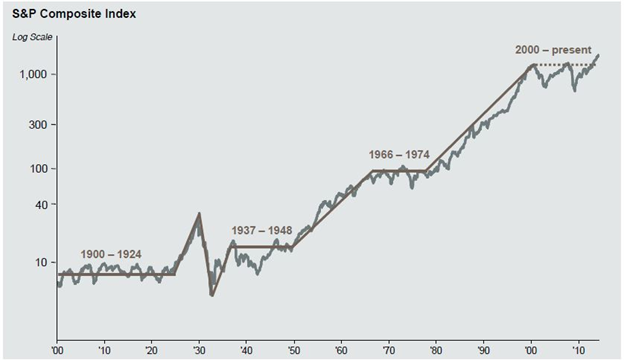April 2014 – An Economic and Market Update
Executive Summary
- Unlike 2013, the Commodities and Real Estate sectors have been the best performers in the first quarter of 2014.
- Recent Market volatility has heightened public sensitivity to the potential of a decline in stock market values.
- Long term market trends seem to suggest long term flat markets lead to sustained bull market runs with growth opportunities.
| MAJOR STOCK INDICES |
YTD 2013 |
| S&P 500 | +1.8% |
| Russell 2000 | +1.1% |
| DJ UBS Cmdty | +7.0% |
| Barclays Bond Agg | +1.8% |
| MSCI EAFA | +.8% |
| Wilshire US REIT | +8.5% |
|
January 1, 2013 to December 31, 2013
|
|
NEW YEAR, NEW STORY
The 1st Quarter of 2014 saw positive gains in the major asset classes, with REIT’s and Commodities being the leaders. Many of the best performing asset classes of 2013, US and International common stocks, have changed places with REIT’s and Commodities, which were laggards in 2013. Aggregate Bond performance notably improved as well, keeping pace with the S&P 500.
THE STOCK MARKET IN PERSPECTIVE
Record stock prices and recent market volatility create concern that the market may not be able to sustain its upward trend. The Financial Media tends to focus on worst outcomes, highlighting experts giving their reasons why. Little is said about the potential for stocks to continue an upward trend or to simply flatten an upward trajectory.

Source: Robert Shiller, Factset, J.P. Morgan Asset Management
Data shown in log scale to best illustrate long-term index patterns
Past performance is not indicate of future returns
Guide to the Markets – US
Data are as of 03/31/14
The chart above offers a striking macro perspective: Three prior periods, each with more than a decade of volatility, each ending with flat returns, each ultimately followed by market growth. Since the current period that began in 2000 we have experienced more than a decade of volatility and relatively flat returns.
MARKET STRATEGY
The objective of our long term asset allocation strategy remains positioned to participate in the next substantial upward trend. While it is appropriate to focus on the underlying causes of market volatility, we believe effective long term asset allocation strategy allows us to gain as much as possible from future economic growth.
We remain committed to both the protection of your assets and the growth of your investment portfolio. We are focused on protecting value, providing you with trusted advice, and assisting you and your family in making good decisions.
Thank you for your continued trust and support. Your input is always welcome and we ask that you contact us with any questions or concerns.
DISCLOSURE
All information is believed to be from reliable sources; however we make no representation as to its completeness or accuracy. All economic and performance data is historical and not indicative of future results. Market indices discussed are unmanaged. Investors cannot invest in unmanaged indices. Additional risks are associated with international investing, such as currency fluctuations, political and economic instability and differences in accounting standards.
Investing in securities in emerging markets involves special risks due to specific factors such as increased volatility, currency fluctuations and differences in auditing and other financial standards. Securities in emerging markets are volatile and can decline significantly in response to adverse issuer, political, regulatory, market, or economic developments.
An index is a statistical measure of change in an economy or a securities market. In the case of financial markets, an index is an imaginary portfolio of securities representing a particular market or a portion of it. Each index has its own calculation methodology and is usually expressed in terms of a change from a base value. Thus, the percentage change is more important than the actual numeric value. An investment cannot be made directly into an index.
Investing in fixed income securities involves credit and interest rate risk. When interest rates rise, bond prices generally fall. Investing in commodities may involve greater volatility and is not suitable for all investors. Investing in a non-diversified fund that concentrates holdings into fewer securities or industries involves greater risk than investing in a more diversified fund. The equity securities of small companies may not be traded as often as equity securities of large companies so they may be difficult or impossible to sell. Diversification nor asset allocation assure a profit or protect against a loss in declining markets.
Past performance is not an indicator of future results.
Securities offered through 1st Global Capital Corp., Member FINRA and SIPC. Bruce Rawdin-Baron, Steven W. Pollock, Sean Storck and Nicole Albrecht are Registered Representatives of 1st Global Capital Corp. Investment advisory services, including RBFI portfolios offered through Rawdin-Baron Financial, Inc. IMS platform accounts offered through 1st Global Advisors, Inc. Rawdin-Baron Financial, Inc. and 1st Global Capital Corp. are unaffiliated entities. Rawdin-Baron Financial, Inc. is a Registered Investment Adviser. Placing business through 1st Global Insurance Services. Registration does not imply a certain level of skill or training. We currently have individuals licensed to offer securities in the states of Arizona, California, Illinois, Indiana, Kansas, Massachusetts, Michigan, New York, Oregon and Washington. This is not an offer to sell securities in any other state or jurisdiction. CA Department of Insurance License: Bruce Rawdin-Baron #0736631, Steven W. Pollock #OE98073, Sean Storck #0F25995 and Nicole Albrecht #0F99962.
Copyright © 2014 Rawdin-Baron Financial Inc., all rights reserved.
Rawdin-Baron Financial, Inc., 4747 Morena Blvd, Ste 102, San Diego, CA 92117
